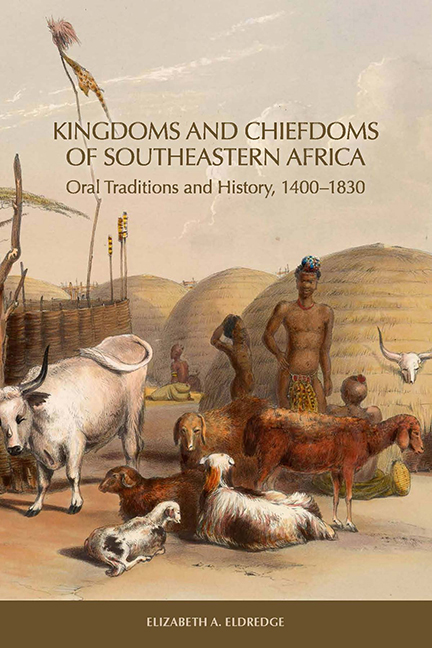Book contents
- Frontmatter
- Contents
- List of Illustrations
- Preface
- 1 History and Oral Traditions in Southeastern Africa
- 2 Oral Traditions in the Reconstruction of Southern African History
- 3 Shipwreck Survivor Accounts from the Sixteenth and Seventeenth Centuries
- 4 Founding Families and Chiefdoms East of the Drakensberg
- 5 Maputo Bay Peoples and Chiefdoms before 1740
- 6 Maputo Bay, 1740–1820
- 7 Eastern Chiefdoms of Southern Africa, 1740–1815
- 8 Zulu Conquests and the Consolidation of Power, 1815–21
- 9 Military Campaigns, Migrations, and Political Reconfiguration
- 10 Ancestors, Descent Lines, and Chiefdoms West of the Drakensberg before 1820
- 11 The Caledon River Valley and the BaSotho of Moshoeshoe, 1821–33
- 12 The Expansion of the European Presence at Maputo Bay, 1821–33
- 13 Southern African Kingdoms on the Eve of Colonization
- Appendix A Ama Swazi King Lists
- Appendix B Chronology of Conflicts, Migrations, and Political Reconfiguration East of the Drakensberg in the Era of Shaka
- Appendix C Interviewees from the James Stuart Collection of Oral Traditions
- Notes
- Bibliography
- Index
Appendix A - Ama Swazi King Lists
Published online by Cambridge University Press: 14 March 2018
- Frontmatter
- Contents
- List of Illustrations
- Preface
- 1 History and Oral Traditions in Southeastern Africa
- 2 Oral Traditions in the Reconstruction of Southern African History
- 3 Shipwreck Survivor Accounts from the Sixteenth and Seventeenth Centuries
- 4 Founding Families and Chiefdoms East of the Drakensberg
- 5 Maputo Bay Peoples and Chiefdoms before 1740
- 6 Maputo Bay, 1740–1820
- 7 Eastern Chiefdoms of Southern Africa, 1740–1815
- 8 Zulu Conquests and the Consolidation of Power, 1815–21
- 9 Military Campaigns, Migrations, and Political Reconfiguration
- 10 Ancestors, Descent Lines, and Chiefdoms West of the Drakensberg before 1820
- 11 The Caledon River Valley and the BaSotho of Moshoeshoe, 1821–33
- 12 The Expansion of the European Presence at Maputo Bay, 1821–33
- 13 Southern African Kingdoms on the Eve of Colonization
- Appendix A Ama Swazi King Lists
- Appendix B Chronology of Conflicts, Migrations, and Political Reconfiguration East of the Drakensberg in the Era of Shaka
- Appendix C Interviewees from the James Stuart Collection of Oral Traditions
- Notes
- Bibliography
- Index
Summary
From the correspondence of James Stuart and Theophilus Shepstone Jr., Stuart's various annotations to his notes, and the comments of Matsebula, we know that of the various published “Swazi kinglists,” all have as their primary source one of Stuart's own informants, John Gama. An early Swazi king list was drawn up by Theophilus Shepstone Jr., known as Offy to distinguish him from his famous father who served as a government administrator in Natal for many years. Offy also served in various capacities, including as an adviser to the Swazi king in 1887 to 1889, before the country came under joint British-Transvaal administration in 1895, followed by British colonial rule in the twentieth century. Colin Webb and John Wright reprinted a letter from Offy Shepstone to James Stuart dated November 15, 1898, because it appeared in Stuart's notebook. It confirms the statement by John Gama that he was the original source of Shepstone's information. Offy wrote to Stuart,
I took a very long time with old John Gama in getting the information which I then and now believe to be accurate. John of course was assisted by the information he had from Edendale men and the Rev. Allison, who was as you know in Swaziland over 40 years ago. I also got information from every old Swazies [sic]. One very old man in particular was very clear in his memory and, as I remarked to Gama at the time, he looked about 2,000 years of age! If you want further information, old John can give it to you. The memo was drawn up for my book which I intend to publish some day…. Yours sincerely, Offy Shepstone.”
One of the earliest Swazi king lists to be published was that of A. Miller, copied by Stuart from the Times of Swaziland, August 21, 1897. It is signifi- cant that since Miller's list appeared in a very public publication, the dates he added may have unfortunately gained credibility and may have created feedback in the sources after 1897. The Miller list has unlikely dating based on a simple assumption of a fifteen-year reign for each king, which certainly distorted the calculation of dates by a matter of centuries over time.
- Type
- Chapter
- Information
- Kingdoms and Chiefdoms of Southeastern AfricaOral Traditions and History, 1400–1830, pp. 327 - 332Publisher: Boydell & BrewerPrint publication year: 2015



